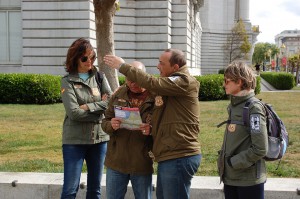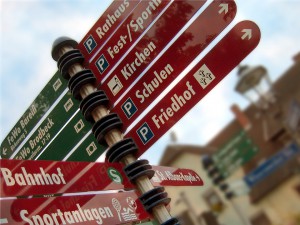Have an international trip coming up but haven’t found the time to get a hang of the local language? Want to be able to communicate with the locals and truly experience all that the place has to offer? Don’t hold back! We understand the struggles of a traveler in this hectic, fast-paced world and have put together just what you need to familiarize yourself with the language before you leave. Even if you’ve got a week, that should be enough to learn the basics you need to get around.

Why speak in the local language while traveling?
The locals tend to open up a lot more to a traveler who is familiar with the local language. In addition to striking a better rapport with the locals, you will find it incredibly useful when you need to figure which bus to take, where to eat, find a rest room, what food to order, etc. Even the simplest of phrases such as ‘I’m sorry, I don’t speak the language, though I’m trying to learn’ can work wonders for you. Given your attempt at the language, the impressed local might even offer to teach you a bit more. And just like that, your journey continues and you might even make a few friends. Before you know it, you will start learning more about the culture and history of the place you’re visiting. What better way to explore a place than as a local!
Here’s what Annette White, blog owner of ‘Bucket List Journey’, has to say about her experience in Africa and how knowing a bit of the local language did wonders for her:
“Immersing yourself with the locals of a destination can lead to a more meaningful travel experience. Connecting doesn’t mean that you have to be fluent in a language, just being armed with a smile and a few basic words in the native tongue can get you far.
When I was visiting an orphanage in Africa, learning a handful of words turned shy children into friends. The uncertain kids peeked out of the doorways, assessing the situation when I arrived. But, I walked in with a big grin on my face and a simple hello in Swahili, which got me a smirk in return. Holding up a rubber balloon towards one of the children I questioned “moja?”, which means one. She nodded. Many of the other children followed her lead. It was a simple toy and a few words that in a matter of minutes transformed bashful youngsters into creative spunky kids. When the memorable visit was almost over, a little African girl came running towards me with her arms wide open, by pure instinct I scooped her up into my embrace. This was a thank you that needed no words, one that crossed language barriers.”
Now that we’ve established what picking up a few bits here and there can do, these 9 simple hacks should be useful to help you kick-start your adventure.
#1: Common phrases that might come in handy
To begin with, if you don’t have much time on your hands, you can keep a bunch of some of the most commonly used phrases ready with you, to use whenever you need.
Katie Bell, blog owner of ‘The World on my Necklace‘, shares a few tips when it comes to common phrases and remembering them:
“Create a phrase card for the new language that can fit in your wallet with some basic phrases and words to help you get by in everyday situations like ordering food, directions, transportation etc, along with the basics – ‘Hello’, ‘Please’, ‘Thank you’, ‘Sorry’, and ‘Goodbye’. ‘Do you speak English?’ is also a good one to know.”
Here’s a list of a few that you might find the need to use more often while traveling (You could make tiny pocket notes for these if you like):
1) Hi, I’m new to this place. How do I get to the nearest bus/metro station?
2) Excuse me, where can I find a department store?
3) Thank you. You have been of great help!
4) Hello, where can I find some good food?
5) How much does this cost?
6) Sorry, I don’t understand. Could you repeat that?
7) I would like 2 cups of coffee, please.
8) Good night. It was nice to meet you.

Build along these lines and come up with more phrases based on whatever might be relevant to you.
You can get these phrases translated to whichever language you want on Google Translate or any such websites/apps (Keep reading for further information on language apps). Omniglot also has a collection of popular phrases in a number of different languages around the world.
Also, putting together a small introduction about where you’re from, what you like to do, etc. might be useful. This may help you have a more interesting conversation with someone who wants to know more about you. After all, meeting new people and engaging in the most random conversations is one of the best parts of travelling!
This is what travel blogger Niranjan Das, author of ‘Tales Of A Nomad‘, has to say:
“While travelling to a foreign country or even to states within India, I usually make an effort to learn a few basic words that would come handy as a traveller. It could be simple words such as ‘Thank you’ and ‘Welcome’ to short phrases such as ‘How far?’ ‘Where is the hotel?’ etc. This also gives me an opportunity to strike a conversation with the locals and most of the time they appreciate it. If nothing works, smiles and sign languages have always been the best ways to connect.”

#2: Be prepared for the response
Now, say you’ve got a sentence ready and can’t wait to use it with someone. You’ve then gone and asked a local what the city is known for and he/she goes on to give you an elaborate description that sounds Greek to you. What then? Don’t stumble and run away. You can tackle this smoothly in two ways. Either stick to objective questions which leave no room for any further deciphering, or be prepared with the translation for “I’m sorry, I don’t understand that much of German/Spanish…Do you speak English?” At least you’ve given it a shot. For example, instead of asking someone what their city is known for, you could probably ask them what the most popular attraction in the vicinity is. This way, you won’t be creating much room for confusion AND you’ll know where you need to go next.
#3: Identifying sign boards
It’ll also be much easier if you can identify sign boards so you can be more independent when it comes to finding your way. It won’t take you much time to get familiar with the alphabets and basic words of the script. Learning to read words such as ‘shop’, ‘pharmacy’, ‘restaurant’, and street names will definitely be of immense use.

Here’s how being able to recognize signage helped Jaclynn Seah, blog owner of ‘The Occasional Traveller‘, during her adventure in Seoul:
“Learning how to read the basic words of the language helps, even if you can’t pronounce it.The first time I travelled solo to Seoul, I learned a little Hangul, which is a phonetic language where every symbol corresponds to a different sound, and how to read the words as they are written in Korean. It helped a lot when it came to signage – even though I had no idea what it meant, I could at least figure out the sounds, which is surprisingly handy when it comes to finding shop signs, street names or identifying what’s on a menu because I already knew some basic Korean food from home.”
#4: Build your foundation (Books or online resources)
If you’ve got some extra time and want to get a better understanding of the language, books and online resources will help you build your foundation and get a better idea of the vocabulary, basic grammar and sentence structure. The way sentences are structured in different languages may vary. For example, “Elke zondag was ik de auto” (Dutch for “Every Sunday I wash the car”) literally translates to “Every Sunday wash I the car” in English. So, you’d probably want to be careful and re-think blindly translating individual words one at a time. Get a picture of the entire sentence you wish to speak and then try getting a hang of how the basic sentence structure works. If you’re short of time, you could neglect the few odd cases where sentences do not adhere to the standard structure. People will get the message you’re trying to convey even if you go wrong once in a while (Well, atleast we hope they do!).

#5: Mobile apps to the rescue!
If you don’t wish to do things the old-fashioned way, lucky for you, thanks to the advent of technology, we now have this amazing ability to walk and talk a foreign language while on the go. There are a number of apps that can be downloaded on your smart phone, within seconds. These include Duolingo, Memrise, Busuu, Google Translate, etc. which will help you pick up the language in a fun way. While Duolingo, Memrise or Mindsnacks are good options for free gamified language learning, apps like HiNative, HelloTalk and TripLingo allow you to get in touch with native speakers and converse with them using voice and text messages. Google Translate, iTranslate, Bing Translator, Voice Translator, iHandy, etc., on the other hand, allow you to translate text and speech in no time and are useful if you need to strike a conversation with a stranger on the street. There you are, breaking language barriers just with the tap of a button! And the best part is, most of these apps are free or require you to pay a minimal amount, but it’ll definitely be worth every penny.

Here’s what Katie Bell, from ‘The World on my Necklace’, had to say about language learning apps:
“When trying to learn a new language at short notice I have had great success with using Duolingo. This excellent language app is free and is a fun and easy way to pick up the basics of a language, by taking part in short lessons each day – all you need is wifi and your phone. You can start learning either before you arrive in the new country, or even once you are there.”
#6: What not to do
Also remember, before going to a new place, look up the internet for things you shouldn’t say or do in a particular place. Cultures vary and you don’t want to offend people, even if it’s unintentionally. For example, a thumbs-up or a handshake may be considered a polite gesture in most countries, but a rude one in some others. It helps to be careful.
#7: Listening
Next. Listen, listen, listen! Active listening is a very important part of picking up a language. The more you listen to people conversing in the language, the better you get at it. Be it through movies, radio, news channels or TV shows, the more you listen, the easier it’ll get. Register the accent, the tone and the gestures so that you feel more like a natural while speaking.

#8: Stay in touch
Another tip that works well is to try not speaking in any other language while you’re at it. The key is to step out of your comfort zone, interact with natives if you know any and if not, just try speaking to yourself. Whatever it is, keep it going so you don’t lose touch. This goes for once you’re back from your trip as well. Knowing multiple languages can be such a bonus and since you’ve invested time and effort in learning whatever you could, why waste it? Better still, go all out and become a pro!
Here’s what Colleen Lanin, founder/editor of TravelMamas.com, has to share about her experience with foreign languages:
“When traveling to a destination that speaks a different language than my own, I always try to learn at least a few key phrases. Most useful are: hello, goodbye, excuse me and thank you. A greeting in the local language goes a long way in terms of showing respect, instead of assuming the shop owner or server speaks English. It’s also very handy to know how to say, “Where are the toilets?” And even if you don’t know how to say this, stick to the word, “toilet” instead of more confusing words like “bathroom,” “restroom,” or “ladies’ room.” Be forewarned, however, that if you ask a question in the foreign language, you are likely to get a response in the foreign language, at which point you might need to repeat it in English anyway.
I lived in France for a year during college but my French skills are very rusty since I never get to practice at home. Before I head to France now on any trip, I am sure to listen to some basic French language downloads on headphones on the plane over as a refresher.On my way to Japan for a recent press trip, I reviewed how to say the basic greetings from my guide book. Once I arrived, I learned a very useful Japanese phrase from one of my fellow journalists from the Philippines who is living and studying in Japan. It’s “sumimasen.” This phrase can be used to say, “hello,” “excuse me,” “sorry,” or “thank you.” Why memorize a bunch of phrases when one will do?!”
#9: Mistakes happen
Last but not the least, don’t worry about making mistakes. If anything, it only helps you get better. You’re bound to go wrong sometimes but hey, learning a new language isn’t easy! Besides, your attempt alone says a lot about you as a traveler-someone who wants to learn new things, meet new people and have great experiences. The desire and interest to blend in with the crowd and discover their city as one of them is what locals appreciate. So go ahead, make a few mistakes, laugh about it, learn from them, and most importantly, have fun with the language!
Don’t forget to share your experience with us! Bon voyage!

